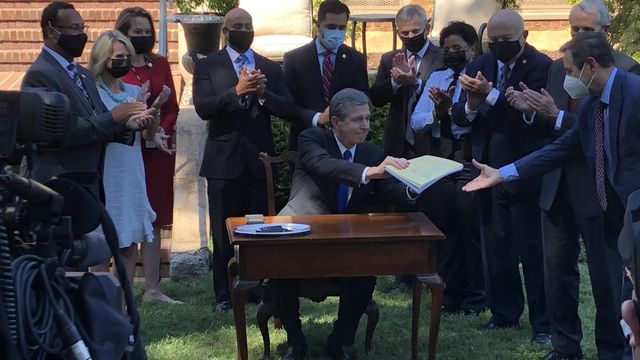Governor signs police reforms into law
Broad reforms, backed by law enforcement, don't go as far as advocates wanted, but the changes are significant.
Posted — UpdatedThe measures also include new tracking meant to keep problem officers from jumping departments by creating databases accessible to law enforcement and a standards commission, though not the public.
There's new required training, new psychological exams for officers and a new requirement that the the State Bureau of Investigation investigate deaths at the hands of law enforcement when the governor, a law enforcement agency head, a district attorney or the commissioner of prisoners requests it.
"No. 1, this is an important step," Cooper said before he signed the bills. "But, No. 2, there is more to do."
Even so, Cooper said he was "excited" to sign the bills, and even activists who have blasted the measures as inadequate attended Thursday's signing ceremony outside the Executive Mansion. The bills had widespread, bipartisan support in the state legislature, as well as support from law enforcement groups and the state's district attorneys.
Fayetteville Police Chief Gina Hawkins, part of a task force Cooper created on criminal justice reform after last year's murder of George Floyd and the protests that followed, called the bills "a well-thought-out blueprint for criminal justice reform" that should move North Carolina toward more professional and accountable policing.
"What would we expect if we take off this uniform? That’s what we should expect," Hawkins said.
Sen. Toby Fitch, D-Wilson, called the legislation "a real positive step," though there's more to do.
But Dawn Blagrove, head of Emancipate NC, called the bill "a very, very small step," and she credited activists and protesters for creating a political climate that made it clear politicians couldn't ignore these issues.
"What we see from this process is there is at least an understanding that it cannot be politically ignored any longer, that the inequities within our criminal justice system have got to be addressed," Blagrove said.
But she said databases created by the bills should be public; otherwise law enforcement is policing itself. She also called the final language in the bill on video from police officers' body-worn and dashboard cameras, which does little to increase public access, "egregious."
"Many of these databases have information we all want to see and have been asking for for a very, very long time, yet it is still being hidden from the public. That is a problem," she said.
Cooper signed three reform bills Thursday: Senate Bill 300, House Bill 436 and House Bill 536. The House bills are redundant to Senate Bill 300, representing a House effort to split reforms across multiple bills, while the state Senate largely rolled them into one.
Here are some of the things the package does:
- It creates a duty for law enforcement officers to intervene if they see another officer using excessive force.
- It creates a public database of law enforcement officer certification suspensions and revocations.
- It creates a new state-level database of any use of force resulting in death or serious injury and requires police departments and sheriff’s offices across the state to supply information on these “critical incidents” to the state Department of Justice
- It requires law enforcement agencies to create an “early warning” system to monitor complaints against officers as well as firearm discharges and use of force.
- It lays out a process to have all law enforcement officer fingerprints entered in state and federal databases.
- It requires that material that calls an officer’s credibility into such question that a prosecutor isn’t comfortable putting him or her on the stand be reported to a law enforcement standards commission and requires that commission to notify other agencies and district attorneys if the officer transfers to another agency. This material is called Giglio material, named after a court precedent.
- It requires psychological screening when officers are certified and new training on mental health.
- It requires the SBI to investigate deaths at the hands of law enforcement, as well as deaths in state prisons or county jails, when the governor, a law enforcement agency head, a district attorney or the commissioner of prisoners requests it.
- It expands mandatory training to include mental health, community policing, minority sensitivity and the new duty to intervene.
- It reduces the time allowed before a first appearance in front of a judge from 96 to 72 hours and requires first appearances in misdemeanor cases.
- It increases penalties for resisting an officer if the action causes an officer to be injured.
- It implements a public awareness campaign on how to “interact lawfully with law enforcement.”
"Our legislation is focused on not only protecting the public but also helping good officers do their job better while ensuring accountability," said Rep. John Szoka, R-Cumberland, a primary sponsor for both House bills.
"It’s a start of weeding out the good and the bad," said Justice Served NC founder Diana Powell, who added that she hopes the oversight actually happens.
"[It needs to be] definitely followed through, that it is done – when an officer sees another officer’s misconduct, that they won’t continue to turn a blind eye," Powell said.
Asked what reforms he'll press for next, Cooper said he'd like to see bodycam footage become more accessible, something he's said for years. He also said he'd like to see a new requirement that an independent prosecutor be brought in to weigh criminal charges against officers when they kill someone.
Blagrove asked Cooper about this in particular during the press conference, and Cooper replied that he looks forward to continued discussions with district attorneys around the state.
The state's Conference of District Attorneys is a strong lobbying force at the General Assembly, as is law enforcement in general.
• Credits
Copyright 2024 by Capitol Broadcasting Company. All rights reserved. This material may not be published, broadcast, rewritten or redistributed.






